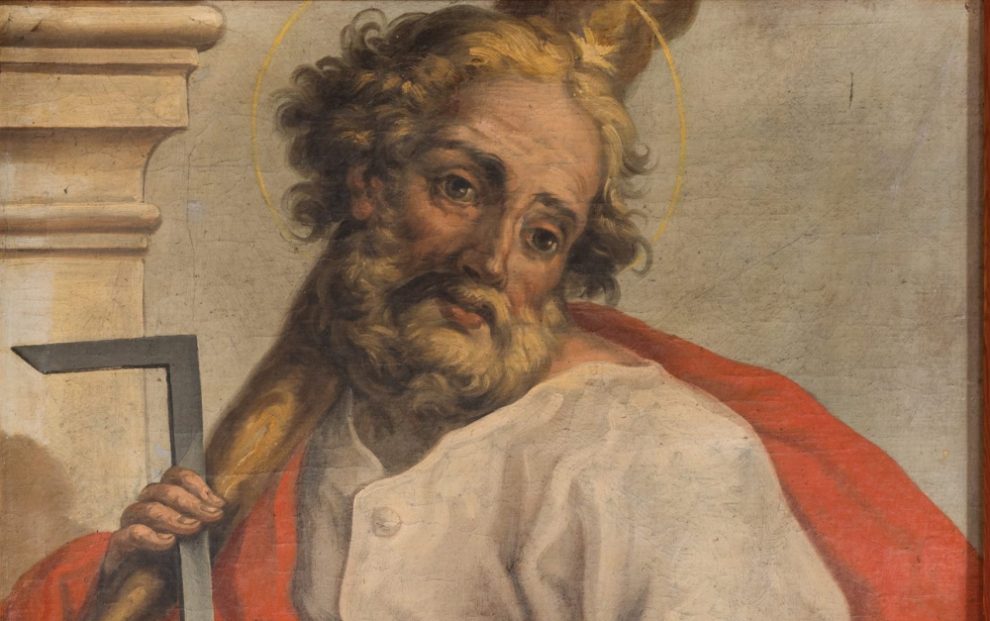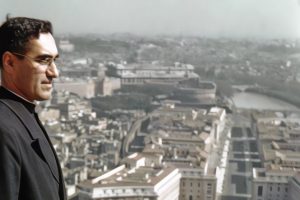I’ve never been one to pray novenas, but I recently downloaded the Hallow app as research for another article I’m writing and, committed to trying out a variety of the prayer experiences the program offers, found myself engaging not only in spiritual practices with which I’m familiar, such as the Daily Examen and lectio divina, but also ones that are new to me, such as the Chaplet of Divine Mercy and novenas.
As I scrolled through Hallow’s novena selection, I landed on the St. Jude Novena because, despite knowing almost nothing about the saint himself, I was aware that he is the patron of impossible causes and desperate situations. Such a tender and hopeful area of patronage. I’m drawn to St. Jude in the same way that I’m drawn to the depiction of Mary as “Undoer of Knots.” I’ve got my knots, I’ve got my desperation; O, Mary and St. Jude, intervene for me!
On my first day of praying the St. Jude Novena, the app prompted me to name my intentions, and I was both surprised and unsurprised by what sprang forth in my mind as I considered which impossible cause to wrangle St. Jude into. I prayed for the health and well-being of my loved ones.
On the one hand, health and well-being are hardly impossibilities; statistically speaking, they are more likely than not, at least in the way I envision them. I’m not asking to be spared ear infections and stomach bugs, though I certainly wouldn’t protest the minimization of such uncomfortable inconveniences. No, when I pray for health and well-being, it’s with the aim of avoiding childhood cancer diagnoses, fatal car accidents, serious mental illness, and other truly devastating circumstances. It isn’t impossible, per se, for me to make it through life without one of my nearest and dearest experiencing a life-altering challenge from this realm of catastrophe. Indeed, I’ve made it so far with such luck.
On the other hand, life inevitably includes suffering and eventual death; in this sense, perpetual well-being is impossible. As my parents age, for instance, their health slowly fades, and I know it’s only a matter of time before one or both of them faces true physical challenges. The fact that they’ve made it to this point with their minds and bodies mostly intact (this isn’t a dig: My dad had polio as a child and has lived with the repercussions since then) is a marker of good fortune. Much to my disappointment, however, previous luck doesn’t necessarily translate to later perspective, at least not in my case. No matter how good I have had it, I know that my heart will be annihilated when my parents’ health deteriorates (which it will). In my ideal vision, they would retain all their senses and remain relatively pain-free with memories and capacities unimpaired until they are, say, 95, at which point they would die peacefully in their sleep. At the same time.
St. Jude, patron saint of impossible causes, copy that?
In all seriousness, witnessing the pain of our loved ones causes true anguish, and the likelihood of escaping this life unscathed is all but impossible. Even as I have been supremely lucky so far regarding the overall well-being of my friends and family, I have a laundry list of wishes related to their welfare. I want my dad’s lingering shingles pain to dissipate. I want my cousin to conceive the baby she longs for. And I want my friend’s brother to be cured of his debilitating anxiety.
As Catherine Newman has titled her recent book, a novel told through the perspective of a middle-aged woman accompanying her best friend through her final weeks of life in a hospice facility, “We all want impossible things.”
As people of faith, this reality inspires the question: What do we do with our all-but-unfeasible hopes and desires?
I don’t shun the miraculous, but even so, I tend to spend more energy expanding my view of miracles than praying for seemingly inexplicable circumstances. Perhaps my favorite line of poetry comes from Sylvia Plath’s “Black Rook in Rainy Weather,” in which she first describes “a certain minor light” that “lean[s] incandescent / out of the kitchen table or chair / as if a celestial burning took / possession of the most obtuse objects now and then,” and then later comments “Miracles occur. / If you care to call those spasmodic / tricks of radiance / miracles.”
I do care to, but really, catching glimpses of the divine in the everyday and recognizing God’s continuing revelation as miraculous has always come more easily to me than asking for the impossible.
I think St. Jude is inviting me to take this leap into asking for that other, more extreme kind of miracle, though. And I’m finding myself thinking, why not give it a try?
I’ve always been drawn to Pascal’s wager, the philosophical argument posited by the 17th-century mathematician and theologian Blaise Pascal contending that a rational person should seek to believe in God and live accordingly. The way Pascal puts it, even if God does not exist, that person will experience only finite loss (being intellectually wrong, possibly sacrificing comfort or pleasure), whereas if God does exist, the person who chooses to believe stands to receive infinite gains and avoid infinite losses.
Some might find Pascal’s pragmatism self-serving and off-putting (as if to say that we only consider what we have to gain from believing in God and not what we owe to our loving creator), but as a person who stands perpetually on the brink of doubt and faith, I find that the argument nudges me in the direction I want to go, the direction of belief over skepticism.
Praying a novena to St. Jude does the same thing for me. Do I necessarily believe that asking for impossible things is going to bring them to fruition? No. But do I think that there is value in naming our deepest desires, whether or not we truly believe that our prayers will accomplish tangible ends? Absolutely. Maybe they will—I’ll do as the poet Mary Oliver says and keep some room in my heart for the unimaginable—and even if they don’t, I believe that asking is a spiritually and emotionally healthy exercise. As a person who craves control, the ability to let go and open my hands a little is a miracle in and of itself.
St. Jude, pray for me.
This article also appears in the May 2023 issue of U.S. Catholic (Vol. 88, No. 5, pages 43-44). Click here to subscribe to the magazine.
Image: Jude the Apostle, Joseph Wannenmacher, 1767-68. Wikimedia Commons.














Add comment